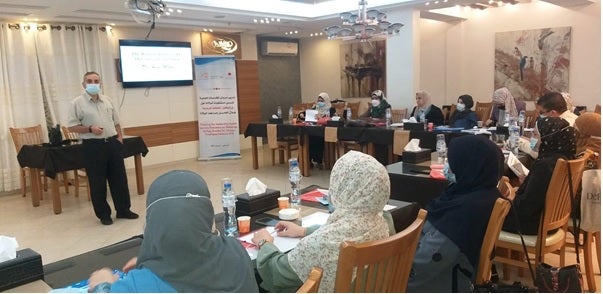‘Reaching zero preventable maternal deaths’ is one of UNFPA’s three global strategic goals for 2030. UNFPA in Palestine has been working towards this goal as part of its expanding sexual and reproductive health program.
Maternal Mortality (MM) is one of the main sexual and reproductive health concerns globally and in Palestine. According to a 2020 UNFPA-lead national study on MM, the Gaza Strip and West Bank witnessed increased ratios of MM, with a 43% rise in cases in 2020 when compared to 2019.
One key intervention to reduce MM ratio and improve maternal health care is the appropriate prevention and treatment of Maternal Near-miss. Maternal Near-miss is when a woman is severely ill or develops complications related to pregnancy and childbirth, which can lead to life-threatening conditions.
Sexual and reproductive health including women’s health is a core work area of UNFPA in Palestine. Through generous support from the Japanese Government and people, UNFPA has provided critical assistance for women in need and has contributed to great advancement in the area of maternal health in Palestine.
Dr Khaled Zimmo, is a consultant of Obstetrics and Gynaecology and the editor of the Maternal Near-miss Committee in Palestine. He reflects on the valuable advancements of maternal mortality related protocols as part of the Japan-funded project, in coordination with local stakeholders. One example is the protocol for pregnancy-related Venous Thromboembolism (VTE) (blood clots in veins), which was followed by a UNFPA-hosted training series for about 100 healthcare providers.

Training session for VTE for healthcare providers in the Gaza © MoH
Dr Khaled discusses how Maternal Near-miss is common in the Gaza Strip, due to several factors including delayed or no access to services and the lack of awareness of symptoms or when to seek medical care. According to the Ministry of Health (MoH), one in three and one in five pregnant women are registered as high-risk pregnancies in the Gaza Strip and West Bank, respectively.
Dr Khaled expressed the valuable contribution of UNFPA through the Japan fund in procuring and distributing 150 Bakri Balloons to all MoH hospitals across the Gaza Strip. He adds: “It is a simple tool yet a life-saving method to control post-partum haemorrhage (bleeding of a blood vessel) in Near-miss cases. Bakri Balloons were not previously available in Gaza, however, this intervention helped to exponentially decrease bleeding-related maternal deaths since 2021”.
Ms. Sama Riziq is the UNFPA Project Coordinator at the Ministry of Health (MoH) in Gaza. She has witnessed the project’s positive impact on women’s health in Palestine. She acknowledges the importance of developing an electronic records system for maternal near-miss cases, which was supported and funded by the same project. “We can now analyse data and detect risk factors much more easily, which helps us to develop need- and evidence-based interventions to reduce maternal mortality rates” She adds.
Sama was a Near-miss case herself during her last pregnancy four years ago. She remembers how tired she was feeling during her last trimester, and how taking iron pills did not help. A day before the delivery, she was cleaning the house, when she started bleeding heavily and was transported to the nearest hospital. The doctors informed her that she was having placenta abruption and must undergo delivery within 30 minutes.
Her newborn daughter was malnourished and had to stay hospitalised for three more days. Sama’s haemoglobin levels remained low and had to receive a blood transfusion. She was also facing difficulties in breastfeeding her new-born, until things started to gradually improve for both Sama and her daughter.
“I was feeling very depressed and tired, I was worried about my daughter’s health, but thankfully the doctors, midwives and nurses at the government hospital were responsive, well-trained and very supportive”, Sama recalls. She also encourages all pregnant women to be careful, not to exhaust themselves during pregnancy, to attend regular check-ups, and to seek medical care when facing an emergency such as vaginal bleeding.
Finally, Sama expressed her gratitude for the Japanese people “Japanese funding means humanitarianism. In Gaza, everyone feels the human touch of Japanese-funded projects. They are based on genuine support from one nation to another. We wish for these impactful projects to remain and expand in the future”.




